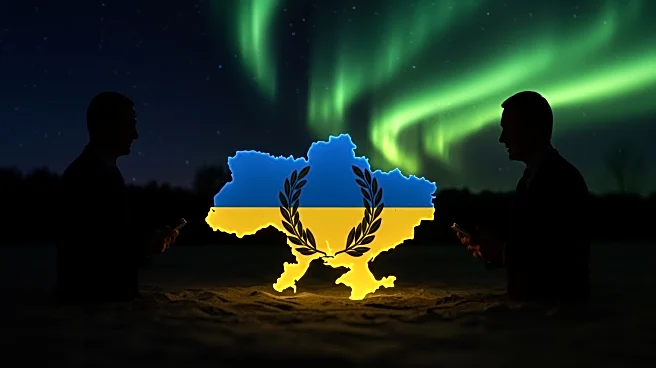What's Happening?
President Trump met with Russian President Vladimir Putin in Anchorage, Alaska, where discussions centered around the ongoing conflict in Ukraine. Trump awarded the meeting high marks, yet the outcome suggests a significant concession to Putin. Trump has agreed to halt negotiations for a ceasefire, aiming instead for a comprehensive peace agreement. This move appears to support Putin's territorial ambitions in Ukraine, particularly in the mineral-rich Donbas region. The meeting concluded with Putin receiving a warm welcome and departing with increased trade relations between the U.S. and Russia, despite the absence of new sanctions or ceasefire deadlines.
Why It's Important?
The Alaska summit marks a pivotal moment in U.S.-Russia relations, with potential ramifications for international diplomacy and the geopolitical landscape. By aligning with Putin's stance, Trump may inadvertently bolster Russia's military operations in Ukraine, challenging NATO's influence and the U.S.'s role as a global mediator. This development could lead to increased tensions in Eastern Europe and affect global energy markets, as Russia's actions in Ukraine have historically impacted oil and gas supplies. Stakeholders in the U.S. and Europe may face economic and security challenges as a result of this shift in policy.
What's Next?
The next steps involve potential diplomatic engagements between Ukraine and the U.S., as Ukrainian President Volodymyr Zelenskyy seeks to navigate the altered political landscape. The absence of a ceasefire agreement may lead to intensified military actions in Ukraine, prompting international calls for renewed negotiations. The U.S. may face pressure from allies to reassess its approach to Russia and Ukraine, while domestic political leaders could debate the implications of Trump's concessions. The global community will likely monitor the situation closely, anticipating further developments in U.S.-Russia relations.
Beyond the Headlines
The ethical implications of the Alaska summit are profound, as Trump's concessions may be viewed as undermining democratic principles and international law. The decision to prioritize a peace agreement over immediate ceasefire negotiations raises questions about the U.S.'s commitment to supporting Ukraine's sovereignty. This shift could influence future diplomatic strategies and alter perceptions of U.S. leadership on the world stage. Long-term, the summit may contribute to a redefined balance of power in Europe, with potential cultural and political shifts in response to Russia's expanded influence.









